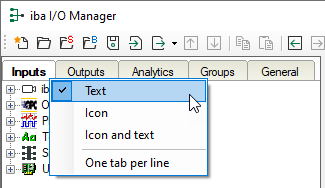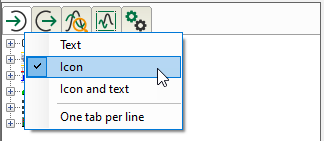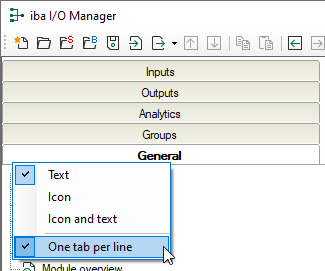Toolbar
|
Symbol |
Description |
|---|---|
|
|
New configuration; then choose whether an empty configuration (reset to factory settings without auto-detect) or a new configuration with auto-detecting the connected modules should be created. If you click on this button while the acquisition is running, an additional option appears offering a new configuration with auto-detect after automatic stop of acquisition. |
|
|
Opens an existing I/O configuration file (XML-file .io). Afterwards, if applicable, the possibility to keep or delete initial values, if the configuration contains corresponding modules. |
|
|
Opens an existing I/O configuration file (.io or .zip) in simulation mode. The loaded configuration is not aligned with the currently existing hardware or licenses and cannot be applied. The simulation mode only provides for display of any I/O configuration. |
|
|
Opens access to the automatically saved backups of the I/O configuration in the path
|
|
|
Saves the current, full I/O configuration in an XML-file. You can select or enter the path and filename in the following dialog. The file extension .io is added automatically. |
|
|
Importing an I/O configuration, which is available in the form of a text file. The I/O configurations of an older ibaPDA system (< V6) as well as modules, groups or profiles that were exported from another ibaPDA system or configured using other tools, e.g., MS Excel, can also be imported. Signal addresses can be imported as decimal or hexadecimal (prefix “0x”) values. You cannot import a complete I/O configuration by using the import function. |
|
|
Button with drop-down list to export to a text file one out of the following:
|
|
These buttons are disabled, unless you can move selected modules within the interface. Move the module by one position up or down in the signal tree of the interface. |
|
|
|
This Button is only enabled if a signal table is open. Pressing this Button will copy the open signal table to the Windows clipboard in order to paste it into another signal table or e.g. Microsoft Excel/Word. |
|
|
This Button is only enabled if a signal table is open. Clicking this Button will paste the contents of the Windows clipboard, provided it is a compatible table, created in I/O Manager or e.g. Microsoft Excel/Word. |
|
Go forward/backward buttons: Navigate to the previous or following step in the I/O Manager. |
Tabs
|
Tabs |
Icon |
Description |
|---|---|---|
|
Inputs |
Here, you can configure data sources (interfaces), modules and signals. |
|
|
Outputs |
Here, you can configure output signals, e-mails and SQL commands for interfaces and modules, which support output of data. |
|
|
Analytics |
Here, you'll find internal interfaces and modules which are rather used for analytic processing of the input and other signals. Included interfaces and add-ons are:
Before introducing the Analytics tab, these interfaces were placed in the Inputs tab. When updating from older ibaPDA versions to v8.4.0 or higher these interfaces will be moved automatically to the Analytics tab. |
|
|
Groups |
Here, you can define signal groups, assign signals to groups and define multidimensional signals (vectors). |
|
|
General |
Here, you can carry out general settings for interfaces and modules, such as address books and certificate management, time synchronization setup or visibility of interfaces. |
You can set up the representation and arrangement of the tabs according to your needs. The arrangement of the tabs is responsive to the available size of the window. The program tries to show the complete text in the tabs. If there is not enough space, the tabs will be arranged one above the other.
Concerning the contents of the tabs you may choose between text, icon or text + icon. Use the context menu on any tab to make your choice.
|
Text (default) |
 |
|
Icons |
 |
|
Icons and text |
 |
|
One tab per line |
 |








